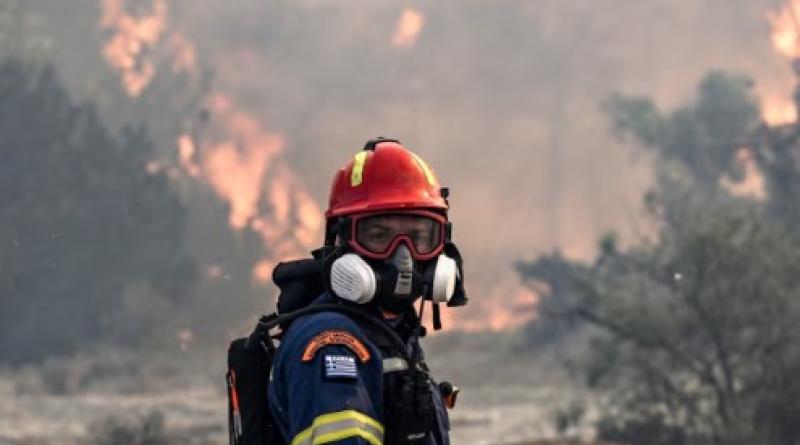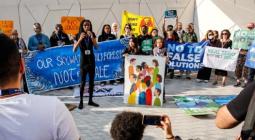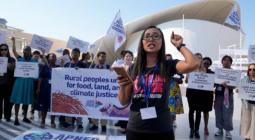Failure to agree fossil fuel phase-out at Cop28 ‘will push world into climate breakdown'

Failure to agree a phase-out of fossil fuels at the UN Cop28 climate summit would push the world beyond the crucial 1.5C temperature limit and into climate breakdown, the UK’s former climate chief has warned.
Alok Sharma, who was president of the Cop26 summit in Glasgow, said it was vital that governments made a clear commitment in the next few days to eliminate coal, oil and gas.
“If you’re going to keep 1.5C alive, you’re going to have to have language on a phase-out of fossil fuels,” he told the Observer in an interview. “And you’re going to need to accompany that with a credible implementation plan.”
He urged governments to act. “We are running out of time. The window on 1.5C is closing fast, and unless we are willing to act now, with the urgency that this issue demands, we will lose that 1.5C,” he said. “We are literally in the last chance saloon to save our children’s future.”
More than 190 governments are meeting in Dubai for the final days of the Cop28 summit, which runs until Tuesday, with the question of whether to phase out fossil fuels at the top of the agenda. At least 100 countries are in favour of a phase-out, but some major fossil fuel producers – including Saudi Arabia, China and India – are opposed.
Sharma was credited with keeping 1.5C “alive” against the odds at the Glasgow summit he led in 2021, when he managed to forge a deal among more than 190 squabbling countries that focused on the goal of limiting global temperature rises to 1.5C above pre-industrial levels.
Green campaigners are worried that countries will come under pressure in Dubai from oil producers to weaken any commitment from a “phase-out” of fossil fuels to a “phase-down”. In the final moments of Cop26, China and India threatened to derail the entire agreement unless a commitment to phase out coal was watered down in this way.
Sharma urged ministers to hold firm to the more stringent target this time. “The language needs to be unequivocal,” he said. “So that anyone who reads the agreed language completely understands that what we’re talking about here is a phase-out of all fossil fuels.”
There are also concerns at Cop28 that countries may opt to phase down only “unabated” fossil fuels. Exactly what this would mean remains unclear in the text, but abatement refers to the use of fledgling technologies, such as carbon capture and storage (CCS), which remove carbon dioxide from the air after it is emitted.
Sharma rejected the idea that CCS could offer a compromise. “We have to be really strict with ourselves,” he said. “If we are going to cut emissions by over 40% by 2030 [as scientists say is needed to limit heating to 1.5C], no abatement technology currently exists to allow us to do that. Yes, we have CCS, but the price has not been falling fast enough and it is not widely deployed enough for it to make a difference in terms of cutting emissions at the level we need. Therefore phasing out the use and production of fossil fuels is clearly something that this Cop has to address.”
The robust intervention by Sharma, one of the UK’s most respected figures in climate politics, is likely to be influential at Cop28, and stands in stark contrast to the brief visit to the summit made by prime minister Rishi Sunak earlier this month.
Sunak was widely criticised after he spent barely 12 hours in Dubai, less time than he spent in the private jet that took him there and back. Though the UK is pushing for a phase-out of fossil fuels, Sunak has vowed to “max out” the North Sea with new licensing rounds for oil and gas fields, leading to accusations of hypocrisy.
Sharma said: “This applies to every country: what you push for at an international level should also be reflected in your domestic policy. There is a feeling among our international partners that the UK has somewhat walked away from the high point of our international climate commitments since Cop26.”
In Dubai, governments are still debating a draft text that contains several potential options, including a phase-out and the option of deleting any reference to fossil fuels.
The Guardian revealed on Friday that Opec had written to its member states calling on them to oppose a phase-out, which the cartel said could mean that “pressure against fossil fuels may reach a tipping point with irreversible consequences”.
The United Arab Emirates, host of the Cop28 summit, is one of the world’s biggest oil and gas producers, and a member of Opec. Sultan Al Jaber, president of the conference, is also the chief executive of Adnoc, UAE’s national oil company, which is planning a massive expansion of its production capacity.
Al Jaber would “feel the weight of the world on his shoulders”, Sharma predicted, as the clock ticks down to the end of the summit on Tuesday. He said: “People are looking for a historic outcome, and there is an opportunity to deliver that.”





